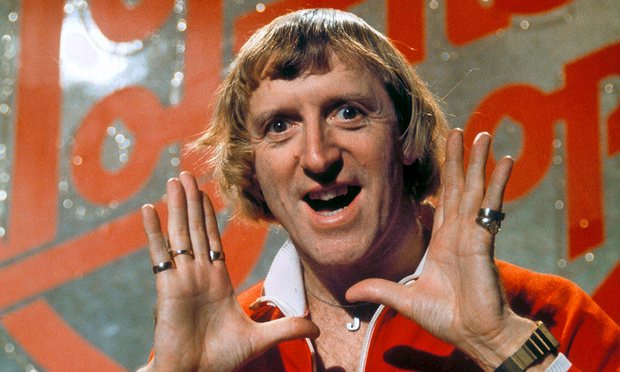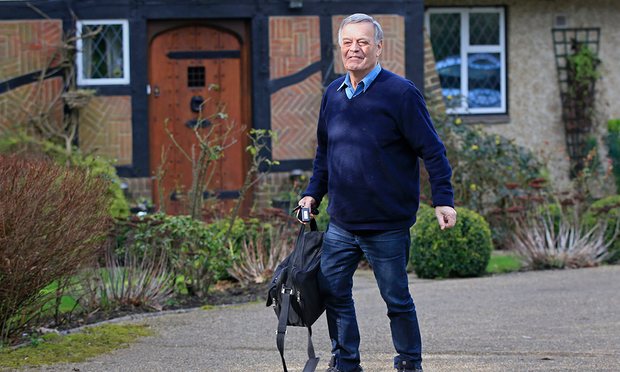"Serious Failings" at BBC Let Jimmy Savile and Stuart Hall Go Unchecked
By Jane Martinson and Jamie Grierson
Regarding abuse by stars and others at the BBC, Smith concluded that the criminal behaviour was largely the fault of the perpetrators, the broadcaster could have stopped it but failed to do so. However, the report ultimately concludes that there is no evidence that the BBC as a corporate body was aware of Savile’s conduct and therefore cannot be convicted of any offence. After speaking to more than 800 people, Smith concluded: Cultural factors at the corporation prevented staff from reporting sexual complaints to senior staff – especially when concerning what she calls “the talent”, a problem which she suggests still exists today. Some members of BBC staff – junior and middle-ranking – were aware of Savile’s inappropriate sexual conduct in connection with his work for the BBC but there is no evidence that any senior member of staff was aware of Savile’s conduct. Several “wake up calls” should have alerted BBC management to Savile’s behaviour as early as 1969 but did not. No complaints were made about Savile to the BBC’s duty office, as would be the appropriate procedure, although there were eight occasions on which complaints were made in other ways. The first complaint was made in the late 1960s and concerned Savile inappropriately kissing a member of staff in Manchester, while subsequent complaints related to sexual assault. There were occasions when senior BBC staff did not find out about things which they ought to have found out about. There was during the period covered by the investigation a culture within the BBC which made it difficult to complain or to “rock the boat”. Smith told a press conference that the report made “sorry reading” for the BBC, adding that “It certainly isn’t a whitewash.” BBC director general Tony Hall apologised to the survivors of abuse and accepted Smith’s findings in full. He also confirmed that the BBC had “parted company” with the DJ Tony Blackburn, saying his evidence to the inquiry had fallen below the standards expected of him. Smith rejected his evidence to her inquiry, in which he denied being questioned over allegations made by a 15-year-old girl. Announcing a review of whistleblowing and child protection procedures, he said: “I accept conclusions and recommendations in full and equally important we have read, we have heard we are listening and we understand. “The importance of getting the culture right in our organisation is key.” The BBC is to launch a campaign explaining its whistleblowing procedures to staff, will work with the NSPCC on child protection and will commission another independent audit. BBC Trust chairman Rona Fairhead said the BBC “failed” victims of Savile and Hall, adding: “It turned a blind eye, where it should have shone a light. And it did not protect those who put their trust in it.” The report into Hall, also published on Thursday, concludes that BBC staff failed to report the presenter indulging in “inappropriate sexual conduct” partly because he was seen as an “untouchable” celebrity. Staff at BBC Manchester knew the former It’s a Knockout host was taking women into his dressing room for sex, although not that some of them were under age, former high court judge Dame Linda Dobbs found. The report said he had abused 21 female victims at the BBC, with the youngest aged 10, between 1967 and 1991, but no complaints were passed on to senior management. In conclusion, Smith wrote: “The delivery of these reports presents an opportunity for the BBC to take steps to ensure that history cannot repeat itself.” In a final verdict which may disappoint campaigners for victims, her “overarching recommendation” was that the BBC should carry out a further review and subsequent audit of its current management. Blackburn dispute Blackburn is now understood to be the celebrity accused of “seducing” 15-year-old Claire McAlpine after taking her back to his flat after a recording of Top of the Pops. McAlpine took her own life a few weeks after the alleged incident. Smith was told that Blackburn, who is named in the report only as A7, was interviewed at the time and denied the allegation. However, Blackburn says he was never interviewed by the BBC.
Asked if she believes Blackburn is lying, Smith refused to say. Smith said although she rejected A7’s version of events, such a view was not part of her terms of reference. “I was looking at how the BBC handle these complaints and the answer is very badly,” she said. Asked about Blackburn, Hall said: “This is one of the most important inquiries in the BBC’s history. There’s a great responsibility on everyone who took part to cooperate fully.” Hall said Blackburn’s engagement with the review fell below standards expected of him. “I am making no judgements or accusations about events or behaviours in the past.” Blackburn said he had been “hung out to dry” by the BBC and vowed to take legal action to clear his name. ‘The talent’ Although largely completed a year ago, the report was delayed by the police investigations and sent to the BBC itself a week ago. In the report, Smith says: “The BBC should examine its attitude towards ‘the talent’. I have reported that the BBC appeared at least in the past to be tolerant of inappropriate conduct by the stars because they were more valuable to the BBC than the BBC’s own values. “The BBC should leave members of the talent in no doubt as to the standards of the behaviour expected of them.” “The first reason for this is because of a deference or even adulation which was, and still can be, accorded to celebrity in our society,” she says. The report found that one complainant was told to “keep your mouth shut; he is a VIP” while talent were “treated with kid gloves and rarely challenged”. The review found that Savile would “gratify himself whenever the opportunity arose” and in “virtually every one of the BBC premises at which he worked”, which included BBC Television Theatre, Television Centre, Broadcasting House, Egton House, Lime Grove studios and studios in Leeds, Manchester and Glasgow. “Savile had a voracious sexual appetite,” Smith writes. “He was obsessively interested in sex.” Smith said Savile’s tactic with young girls was to invite them to watch him perform either on radio or television as a “form of grooming”. “He used his celebrity status, his entree to the BBC and his connections with other stars as bait with which to draw young girls into his sphere.” In addition to unnamed supervisors and technical staff who worked on shows like Top of the Pops, Smith lists other examples of people who knew or suspected Savile was behaving inappropriately or illegally. Canon Colin Semper, a producer of Speakeasy, worked with Savile and “clearly did think Savile had sex with a lot of girls, some of whom might have been underage. Louis Theroux became aware of a credible allegation that in the late 1960s or early 1970s Savile had sex with a 15-year-old. Theroux spoke to David Mortimer, an executive producer at the BBC. Mark Lawson saw Savile assault a female member of Front Row staff. He told Front Row editor John Goudie. Douglas Muggeridge, the controller of Radio 1 and Radio 2 heard rumours about Savile. He held a meeting with Savile, Derek Chinnery, head of programmes for Radio 1 and Doreen Davies, an executive producer. Rodney Collins, a BBC Radio publicity officer, heard rumours too but had no hard evidence. ‘Awareness’ of Hall The Hall investigation was set up by the BBC on 4 June 2013 when Hall had pleaded guilty to 14 charges of indecent assault involving girls as young as nine. The report said: The Hall investigation received a body of evidence from which a “powerful inference” may be drawn that there was a “high degree of awareness” that Hall was using his dressing room for sexual activity. Some witnesses thought that between 1959 and 1981 management “must have known” something of Hall’s sexual activities. Fears of reprisal, reputational loss and the power and “untouchability” of Hall were among impediments to any action being taken.
|
.
Any original material on these pages is copyright © BishopAccountability.org 2004. Reproduce freely with attribution.

